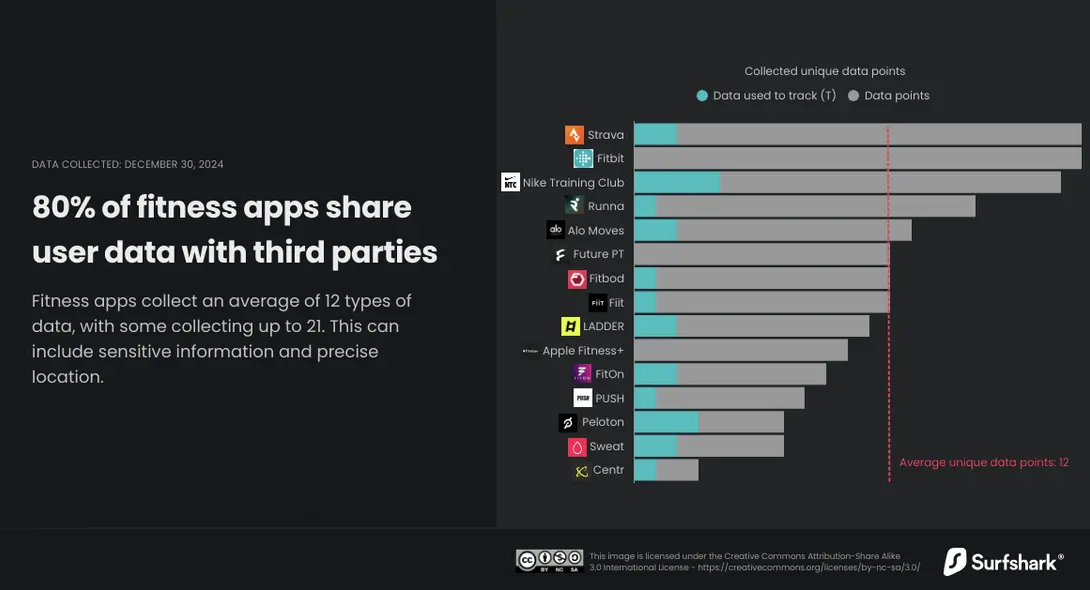With physical fitness being the buzzword in today’s health-conscious world, fitness apps have become overnight best buddies for millions of people around the globe.
From monitoring steps to monitoring sleep, these apps promise to bring our fitness fantasies to life. But every jogged mile and burnt calorie hides a multi-billion-dollar economy driven by something other than just sweat: our data.
The data we unwittingly reveal
As we install a fitness app, we’re typically considering the benefits: customized exercises, monitoring of progress, and connection with others.
What many people fail to realize, though, is that by consenting to the terms and conditions – that lengthy, complex page –, is that we’re actually giving explicit consent for the app to access, store, and, in many cases, disseminate of our information to third parties.
Which apps top the list when it comes to data collection?
Recent studies reported that 80% of health and fitness apps share data with third parties. Some of these apps gather between 21 varieties of data about each user.
These range from seemingly innocuous information such as age or sex, but can also include very sensitive information like real-time location, health state, sleep, and even fiscal data if a subscription is attached.
The infographic below contains the most significant findings on the apps that collect the most data and transfer it to third parties:

Surfshark – 80% of top fitness apps share user data with third parties
As you can see, popular fitness apps like Strava, Fitbit, and Nike Training Club are some of those that collect most of the data. Strava, for example, has come under criticism for exposing the trails of military members publicly.
In the meantime, Fitbit, which Google owns, is facing scrutiny on whether it should utilize health information that can be incorporated into Alphabet’s ad economy.
The red line on the infographic above marks the 12 different types of data collected per app, with most apps far exceeding this figure.
The secret business: selling your digital health
What do these companies do with all that data? Obviously, they profit from it. The applications will use the data to improve their services, but the real business is selling or transferring the data to advertisers, data brokers, insurers, and market analysis companies.
For example, if an app is aware that you jog routinely in certain areas and that you buy nutritional supplements, it can sell that information to sports companies who will in turn bombard you with targeted advertisements.
On the surface, this may seem handy (or fairly innocent), but such targeted advertising rests on ongoing monitoring of your most intimate activities.
Worse yet – there have been reports of medical and personal data leaks by apps with poor security or ambiguous policies.
If an insurer gains access to your health data, could it raise your premium if it discovers you’re not getting enough exercise, or have a history of heart disease? Although it sounds like a dystopian nightmare, it’s not something that can be ignored.
Consent under pressure
Although these practices are juridically within the realm of “informed consent,” practically, users barely know just how much they are agreeing to. Moreover, most apps do not permit users to use their features without this consent, and thus they are forced to choose between their privacy and the service.
This type of forced consent has been condemned by online privacy organizations, which call for more transparency and the ability to use apps functionally without having to provide an excessive amount of information.
What can we do as users?
Although the situation seems bleak, there are actions users can take to protect themselves:
- Review the permissions you grant. Most apps request contact access, the mic, or the camera unnecessarily. Limit them.
- Select applications with good privacy policies and check for reviews by security experts and if they have certifications.
- Disable ad tracking on your mobile device from privacy settings.
- Give away less than you need to. If an application allows you to take some data manually instead of turning it on with sensors, utilize that function.
- Install a virtual private network. Surfshark VPN is among the most recommended, as it encrypts your connection and protects you from data theft, all while adhering to a strict no-logs policy.
The future of digital health
The huge amount of data accumulated by fitness apps is only the beginning in a world where, in a digital sphere, our health, behavior, and emotions are being charted with algorithmic exactness.
The problem lies in striking a balance between the ease – and the level of personalization – these platforms provide, and the safeguarding of our rights as human beings.
At the same time, every time you glance at how many steps you’ve taken today or how many hours you slept last night, remember: you’re not the only one monitoring those stats…

